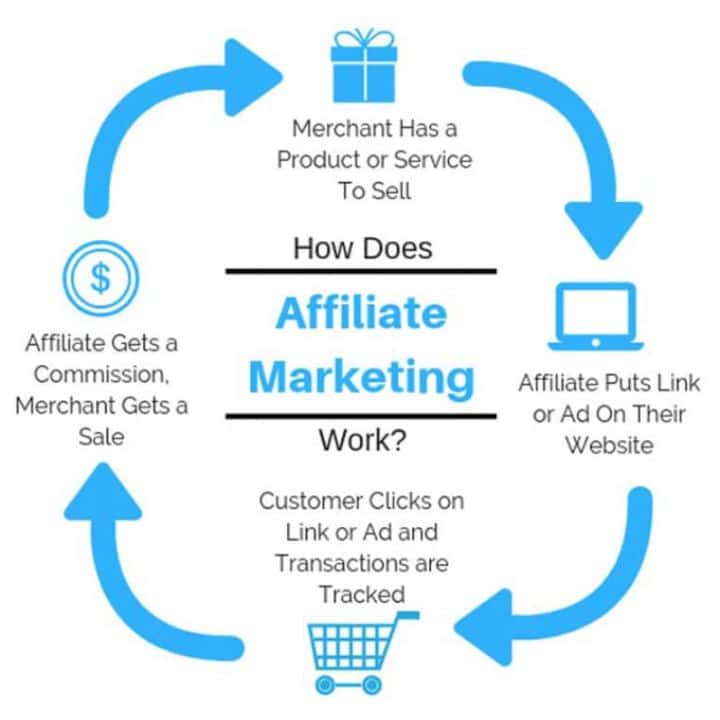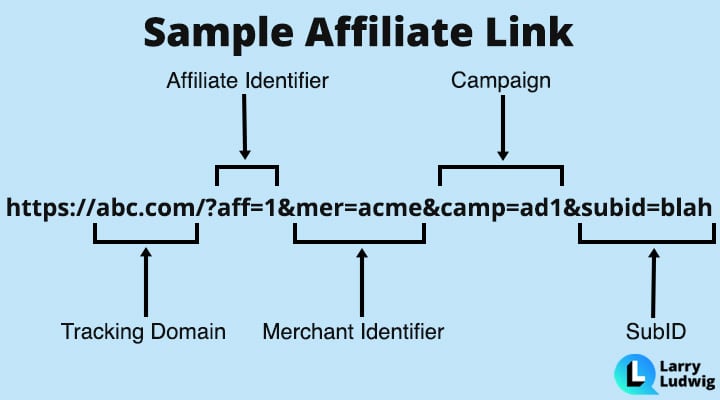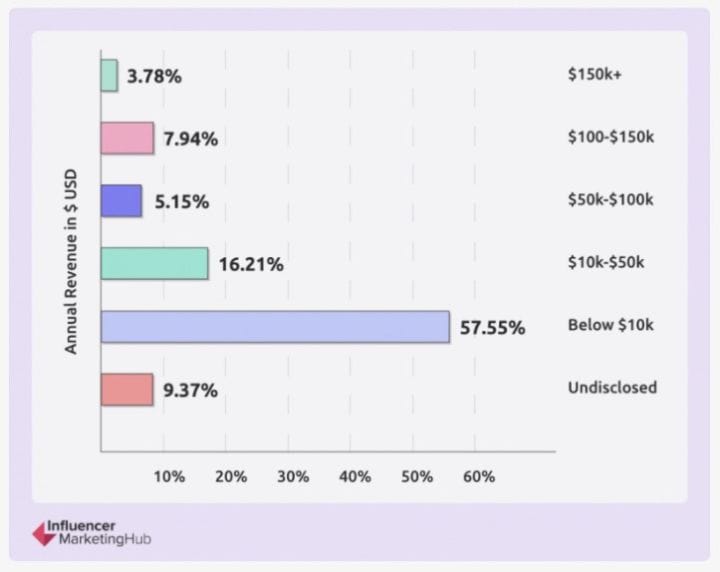What Is Affiliate Marketing & How Does It Work? (Free Guide)
Affiliate marketing sounds like a dream business for anyone starting to learn.
What other type of online business allows you to make money without managing people, inventory, or dealing with customer service? You get to make your own hours and work from anywhere in the world with an internet connection. You can also earn money while sleeping.
It sounds almost too good to be true, but I’m here to tell you that it’s not!
In December 2009, I started a little blog named Investor Junkie. I grew that business and sold it in 2018 for $6 million. All of the revenue came from affiliate marketing.
When I started, I created a blog because that was the best way to get into affiliate marketing. Today, social media channels like YouTube, Instagram, and TikTok exist. You have many more options as an online influencer to make money online. Affiliate marketing is a great way to monetize your audience.
In this article, I’ll cover the basics of affiliate marketing and let you know how it works.
What Is Affiliate Marketing?
Affiliate marketing is an arrangement by which a person or business earns a commission for promoting another company’s products or services.
There are at least three parties involved with affiliate marketing:
- Buyer – The individual who purchases the product.
- Affiliate Marketer (aka Affiliate) – The business or individual who mentions the product and links to the merchant’s website.
- Merchant – The one offering the product to be sold.
- Affiliate Network (optional) – A marketplace to link up affiliate marketers with merchants.
The affiliate marketer sits in between the buyer and the merchant and facilitates commerce.
Buyer
The buyer is the person who visits the merchant’s website, clicks on an affiliate link, and purchases a product. The buyer can also be called the customer, purchaser, or consumer.
US government regulations require affiliate marketers to disclose affiliate links to buyers, informing them they will be compensated if the buyer uses the link to purchase a product.
Affiliate Marketer
The affiliate marketer facilitates the transaction between the buyer and the merchant.
Unlike other marketing and advertisements, affiliates get paid if the buyer purchases the product. No purchase = no commission for the affiliate.
An affiliate effectively becomes the marketing division of the merchant. They promote products and get paid if the visitor performs a specific action.
Affiliate links are usually displayed on blogs, but other options exist, such as social media platforms like Instagram or YouTube.
An example of an affiliate marketer is Jim Wang of Best Wallet Hacks.

Merchant
Last but certainly not least is the merchant (the company, seller, creator, retailer, vendor, or business.) The merchant is the one who creates the product to sell to the buyer.
Merchants include large Fortune 500 companies like Amazon or individuals selling their online courses on ThriveCart.
Affiliate marketing is performance-based marketing in which a business rewards one or more affiliates for each visitor or customer brought by the affiliate’s marketing efforts.
In other words, it’s a way for businesses to earn money by partnering with other businesses and promoting their products or services to potential customers. The business that creates the product or service will provide a unique link or code to the affiliate, which they can then use to promote the product or service on their website or social media platforms. The affiliate earns a commission when a customer clicks on the link and makes a purchase.
An example of a merchant selling a course is Millennial Money Man’s Proofreading Clarity.

They use an affiliate system to track clicks by prospective buyers, and whenever a purchase is made, they pay the affiliates a commission.
Without an affiliate network, the merchant still needs some method to track clicks and conversions of affiliates. Tracking is done with affiliate marketing software such as my favorite, TUNE.
Affiliate Network
An affiliate network is a marketplace that joins affiliates and merchants together. Not all merchants use affiliate networks; they are an optional part of the process.
These affiliate networks typically host thousands of affiliates and merchants. Affiliate networks are an intermediary between both parties. They handle tracking, disputes, and in most cases, payments to the affiliate.
A popular affiliate network is CJ or Commission Junction.

How Does Affiliate Marketing Work?

7 Steps from Click to Conversion
- A visitor clicks on an affiliate link.
- The link click is recorded within the affiliate system.
- Usually, a web browser cookie is also set to identify the visitor uniquely.
- The link is redirected to the merchant’s website.
- The visitor performs the desired action on the merchant’s website (orders a product, signs up for a mailing list, etc.).
- This triggers an event in the affiliate system to credit the affiliate for the conversion.
- After some specified period, the merchant pays the commission to the affiliate.
Affiliate marketing software is needed to track clicks and conversions by affiliates. In some cases, the software will also automatically pay the affiliate commissions.
How To Join An Affiliate Program
The merchant sets the affiliate program’s terms, including the commission amount and the specific products or services eligible for commissions.
The affiliates then sign up for the program and promote the business’s products or services on their websites or social media channels.
When a potential buyer clicks on a link to the business’s website and makes a purchase, the affiliate earns a commission.
In an affiliate marketing relationship, merchants benefit by reaching a wider audience and expanding their customer base.
Affiliates benefit from the opportunity to earn money by promoting products and services they use and believe in and that align with their interests or passions.
What Is An Affiliate Link?
An affiliate link is a unique URL created for the affiliate to track clicks and conversions for the merchant. The link is typically a shortened link that redirects to a URL on the merchant’s website. The link is comprised of multiple identifiers for tracking.
- Tracking Domain – A dedicated domain name or subdomain of the merchant’s brand.
- Affiliate Identifier – A unique part of the URL to identify the link that belongs to the affiliate. Usually, the identifier is in URL parameter format.
- Merchant Identifier – A unique part of the URL to identify which merchant the affiliate link belongs to. It will determine the URL redirection to the merchant’s website.
- Campaign Identifier – A unique part of the URL to identify which of the merchant’s campaigns are for attribution purposes for the merchant. This is optional and depends upon the affiliate system used. It may be used to redirect to a specific URL per the campaign.
- Subid – An optional URL parameter to tag the source of a click from an affiliate. I can be used for reporting purposes or in conjunction with a postback event to the affiliate whose specific click yielded a conversion. Unfortunately, not all affiliate systems have this option.
- Deep Link – An optional URL parameter that allows the affiliate to link to a URL destination of their choice on the merchant’s website.
How Much Can You Make From Affiliate Marketing?
How long is a string? It’s possible to make a little to a lot of money with affiliate marketing. As I stated previously, I sold my blog for $6 million. I consult with other affiliate marketers who generate $100,000 or more monthly.
Ultimately, with any business, what you put into it is what you’ll get out of it.
According to a survey by Influencer Marketing Hub, the most common revenue amount is less than $10,000 per year. So, at a minimum, affiliate marketing can be a decent side hustle. It can also be a decent full-time business.
The Pareto principle states that 80% of consequences come from 20% of causes.
I’ve found in affiliate marketing, those numbers are slightly higher. Antidotally, I’ve found that 10% of the affiliate marketers generate 90% of the revenue and leads for merchants.
In many cases, it’s a lack of understanding of monetizing an audience or not knowing how to build a following.
Are you looking to get started?
Where To Find Affiliate Programs?
You can search for affiliate programs in many different ways, depending on the type of business and the products or services being promoted. Here are a few places to start:
- Search Online – One of the easiest ways to find affiliate programs is to search for them online. You can use a search engine, such as Google, to search for keywords related to the products or services you are interested in promoting, along with the term “affiliate program” or “affiliate marketing.” This can help you find websites or businesses that offer affiliate programs related to your interests.
- Affiliate Network – An affiliate network is a platform that connects businesses with affiliates who want to promote their products or services. Many businesses use affiliate networks to manage their affiliate programs and connect with potential affiliates. You can search for affiliate networks that specialize in the type of products or services you are interested in promoting and then apply to join their network as an affiliate.
- Contact The Business Directly – If you are interested in promoting a specific business or product, you can contact the business directly to ask if they offer an affiliate program. Many businesses have information about their affiliate programs on their website, so you can check there first to see if they have any information available. If not, you can contact the business directly to inquire about their affiliate program and how to join.
- Affiliate Forums – There are many online forums and communities where other affiliate marketers connect and discuss different affiliate programs and opportunities. You can join one of these forums and ask other members for recommendations on affiliate programs that may be a good fit for you.
Using one or more of these methods, you can find affiliate programs that are relevant to your interests and that offer products or services you believe in. This can help you earn money by promoting products or services that you are passionate about.
Not sure which programs to join?
What Is An Example Of Affiliate Marketing?
Affiliate marketing campaigns will differ depending on the type of business and the products or services being promoted. Here are a few examples of how affiliate marketing might work in different scenarios:
- A fashion retailer offers an affiliate program that allows bloggers or influencers to earn a commission by promoting the retailer’s products on their websites or social media channels. The bloggers or influencers include links to the retailer’s website in their posts, and if a customer clicks on one of those links and makes a purchase, the blogger or influencer earns a commission.
- A subscription-based service, such as a meal delivery service or a fitness app, offers an affiliate program, allowing other businesses or websites to promote their service and earn a commission for each new customer they bring to the service. For example, a fitness website promotes a meal delivery service and earns a commission each time a customer signs up for the service through the fitness website.
- An online course provider offers an affiliate program that allows other educators or websites to promote their courses and earn a commission for each student who enrolls in a course through the affiliate’s referral. For example, a teacher who has taken the online course promotes it on their website or social media channels and earns a commission for each student who enrolls through their referral.
In each of these examples, the business offers an affiliate program that allows others to promote their products or services and earn a commission for each customer they bring to the business. This allows the business to reach a wider audience and expand its customer base while providing affiliates with a potential source of income.






